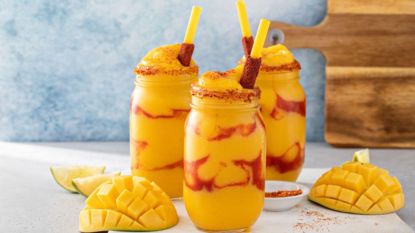Is It OK to Drink Coffee on an Empty Stomach During an Intermittent Fasting Diet?

Intermittent fasting, such as the 16:8 diet and the 5:2 diet, has become the most popular weight-loss method for folks trying to shed pounds very quickly. Whichever diet someone chooses, it will involve waiting until a certain time of day to begin consuming calories. Luckily, black coffee has a negligible amount of calories (less than five, according to the Mayo Clinic) and can be consumed without breaking your fast. That might be difficult for coffee fans who prefer to sweeten their java with sugar or milk, but they can usually find a way around it with zero or low-calorie options available.
That said, is it even OK to drink coffee on an empty stomach? Several articles circulated in 2017 warning against the potential “havoc” it could wreak — but is there any truth to it? Countless people say that their ability to drink their morning cups of coffee is what helps them maintain their fast during these diets, and they’ve even reported no adverse effects. Of course, because everyone’s body reacts differently to foods, we decided to get to the bottom of these conflicting reports.
Is it bad to drink coffee on an empty stomach?
In November 2017, a report from Express brought the question to Dr. Adam Simon, chief medical officer at the online medical consultation site Push Doctor. According to Dr. Simon, coffee stimulates the production of stomach acid, which can cause damage to the stomach lining without any food there to protect it. He went on to explain, “It can increase the amount of water you pass and can potentially create symptoms of dehydration. It can affect your pulse, causing an irregular heartbeat by putting pressure on the heart, and it can adversely affect your blood pressure.” Dr. Simon recommended adding milk or butter to your coffee to prevent those issues.
Obviously, that flies in the face of intermittent fasting, unless you happen to schedule your eating time around the morning rather than the evening. The good news is that while Dr. Simon’s advice shouldn’t be completely ignored, the Scandinavian Journal of Gastroenterology studied all of the effects of coffee and found slightly different results. The researchers did discover similar levels of gastric acid production, but didn’t place any blame on the beverage for causing issues on the stomach lining. According to their report, “Coffee contains no calories, and its effects on the gastrointestinal tract cannot be ascribed to its volume load [or] acidity… Caffeine cannot solely account for these gastrointestinal effects.” Another study from 2013 also found no connection between coffee and the development of stomach ulcers.
With all of that in mind, you shouldn’t worry too much about sipping on coffee while fasting unless you happen to notice any issues starting to upset you. It’s really all about paying closer attention to your body (and your doctor), which is what you should be doing anyway while on a diet. The most common issue cited by a group of Reddit users who share advice on intermittent fasting was heartburn, so you should probably skip the cup of joe if you’re prone to that particular problem. Otherwise, enjoy your best java life!
More From FIRST
The Warrior Diet Is Intermittent Fasting for Those Who Love Eating at Night
Drinking Tomato Juice on a Daily Basis Can Help Kick Belly Fat to the Curb
Pre-Meal Rituals Can Help You Lose Weight — If You Pick the Right Ones













